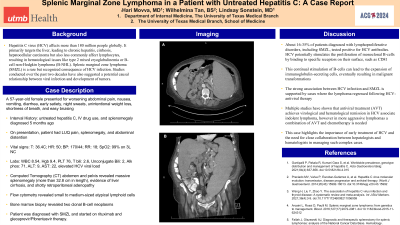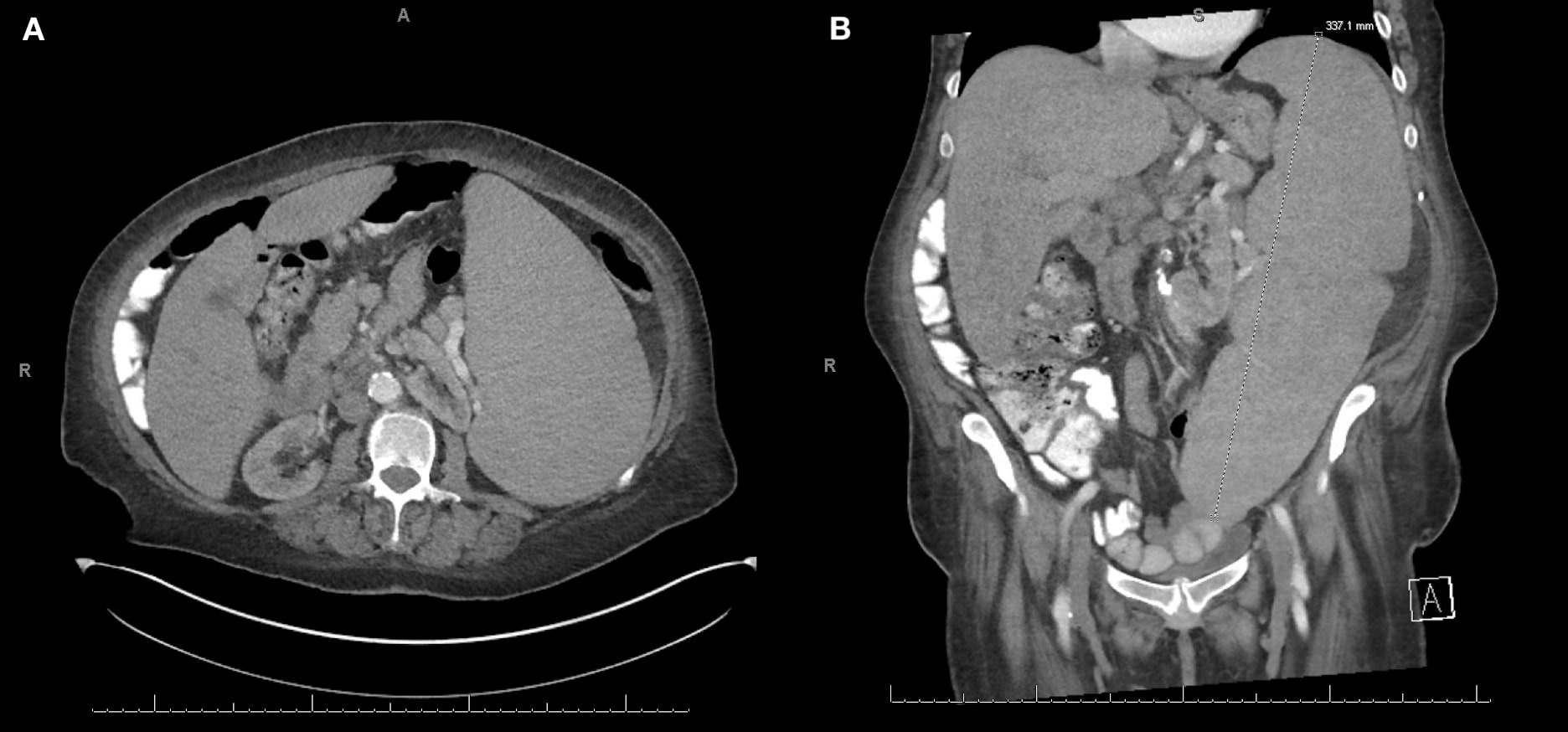Sunday Poster Session
Category: Liver
P1299 - Splenic Marginal Zone Lymphoma in a Patient With Untreated Hepatitis C: A Case Report
Sunday, October 27, 2024
3:30 PM - 7:00 PM ET
Location: Exhibit Hall E

Has Audio
- HM
Hari Movva, MD
University of Texas Medical Branch
Galveston, TX
Presenting Author(s)
Hari Movva, MD1, Wilhelmina Tan, 2, Lindsay Sonstein, MD1
1University of Texas Medical Branch, Galveston, TX; 2University of Texas Medical Branch, John Sealy School of Medicine, Galveston, TX
Introduction: Hepatitis C virus (HCV) affects more than 180 million people globally. It primarily targets the liver, leading to chronic hepatitis, cirrhosis, hepatocellular carcinoma but also less commonly affect lymphocytes, resulting in hematological issues like type 2 mixed cryoglobulinemia or B-cell non-Hodgkin lymphoma (B-NHL). Splenic marginal zone lymphoma (SMZL) is a rare but recognized consequence of HCV infection. Studies conducted over the past two decades have also suggested a potential causal relationship between viral infection and development of tumors.
Case Description/Methods: A 57-year-old female presented to the Emergency Department (ED) for worsening abdominal pain, nausea, vomiting, diarrhea, early satiety, night sweats, unintentional weight loss, shortness of breath, and easy bruising. Interval history includes untreated hepatitis C, IV drug use, and splenomegaly diagnosed 5 months ago. Lab work showed an elevated HCV viral load while cirrhosis relevant labs were within normal limits. Computed Tomography (CT) abdomen and pelvis revealed massive splenomegaly (more than 32.8 cm in length), evidence of liver cirrhosis, and shotty retroperitoneal adenopathy. Flow cytometry revealed small to medium-sized atypical lymphoid cells. Bone marrow biopsy revealed two clonal B-cell neoplasms. Patient was diagnosed with SMZL and started on rituximab and glecaprevir/Pibrentasvir therapy.
Discussion: About 16-35% of patients diagnosed with lymphoproliferative disorders, including SMZL, tested positive for HCV antibodies. HCV potentially stimulates the proliferation of monoclonal B-cells by binding to specific receptors on their surface, such as CD81. This continual stimulation of B-cells can lead to the expansion of immunoglobulin-secreting cells, eventually resulting in malignant transformations. The strong association between HCV infection and SMZL is supported by cases where the lymphoma regressed following HCV-antiviral therapy. Multiple studies have shown that antiviral treatment (AVT) achieves virological and hematological remission in HCV associate indolent lymphoma, however in more aggressive lymphomas a combination of AVT and chemotherapy is needed. This case highlights the importance of early treatment of HCV and the need for close collaboration between hepatologists and hematologists in managing such complex cases.

Disclosures:
Hari Movva, MD1, Wilhelmina Tan, 2, Lindsay Sonstein, MD1. P1299 - Splenic Marginal Zone Lymphoma in a Patient With Untreated Hepatitis C: A Case Report, ACG 2024 Annual Scientific Meeting Abstracts. Philadelphia, PA: American College of Gastroenterology.
1University of Texas Medical Branch, Galveston, TX; 2University of Texas Medical Branch, John Sealy School of Medicine, Galveston, TX
Introduction: Hepatitis C virus (HCV) affects more than 180 million people globally. It primarily targets the liver, leading to chronic hepatitis, cirrhosis, hepatocellular carcinoma but also less commonly affect lymphocytes, resulting in hematological issues like type 2 mixed cryoglobulinemia or B-cell non-Hodgkin lymphoma (B-NHL). Splenic marginal zone lymphoma (SMZL) is a rare but recognized consequence of HCV infection. Studies conducted over the past two decades have also suggested a potential causal relationship between viral infection and development of tumors.
Case Description/Methods: A 57-year-old female presented to the Emergency Department (ED) for worsening abdominal pain, nausea, vomiting, diarrhea, early satiety, night sweats, unintentional weight loss, shortness of breath, and easy bruising. Interval history includes untreated hepatitis C, IV drug use, and splenomegaly diagnosed 5 months ago. Lab work showed an elevated HCV viral load while cirrhosis relevant labs were within normal limits. Computed Tomography (CT) abdomen and pelvis revealed massive splenomegaly (more than 32.8 cm in length), evidence of liver cirrhosis, and shotty retroperitoneal adenopathy. Flow cytometry revealed small to medium-sized atypical lymphoid cells. Bone marrow biopsy revealed two clonal B-cell neoplasms. Patient was diagnosed with SMZL and started on rituximab and glecaprevir/Pibrentasvir therapy.
Discussion: About 16-35% of patients diagnosed with lymphoproliferative disorders, including SMZL, tested positive for HCV antibodies. HCV potentially stimulates the proliferation of monoclonal B-cells by binding to specific receptors on their surface, such as CD81. This continual stimulation of B-cells can lead to the expansion of immunoglobulin-secreting cells, eventually resulting in malignant transformations. The strong association between HCV infection and SMZL is supported by cases where the lymphoma regressed following HCV-antiviral therapy. Multiple studies have shown that antiviral treatment (AVT) achieves virological and hematological remission in HCV associate indolent lymphoma, however in more aggressive lymphomas a combination of AVT and chemotherapy is needed. This case highlights the importance of early treatment of HCV and the need for close collaboration between hepatologists and hematologists in managing such complex cases.

Figure: Figure 1.A CT abdomen axial view showing splenomegaly. Figure 1.B. Coronal view showing massive splenomegaly.
Disclosures:
Hari Movva indicated no relevant financial relationships.
Wilhelmina Tan indicated no relevant financial relationships.
Lindsay Sonstein indicated no relevant financial relationships.
Hari Movva, MD1, Wilhelmina Tan, 2, Lindsay Sonstein, MD1. P1299 - Splenic Marginal Zone Lymphoma in a Patient With Untreated Hepatitis C: A Case Report, ACG 2024 Annual Scientific Meeting Abstracts. Philadelphia, PA: American College of Gastroenterology.
